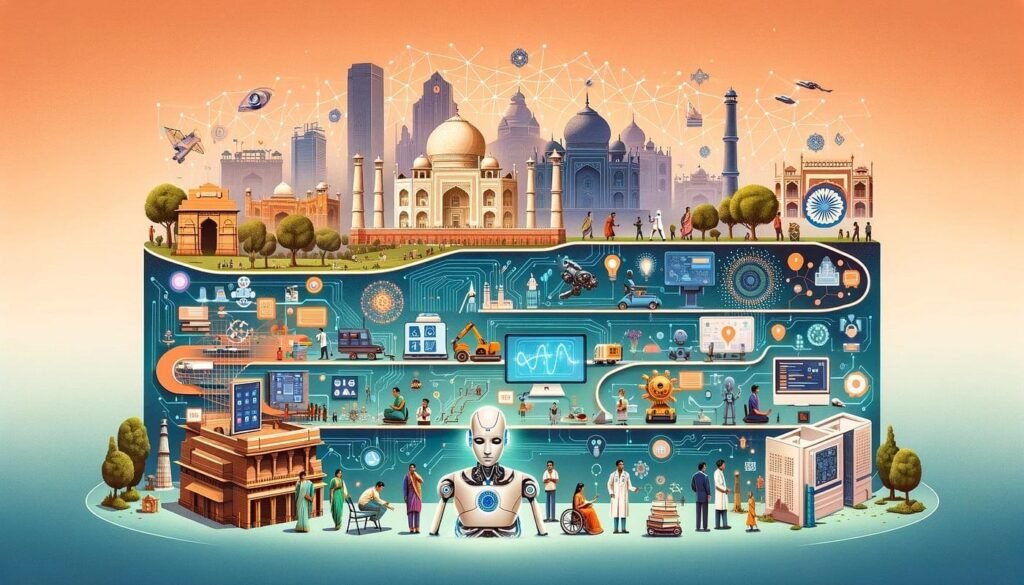Introduction
India’s rapid urbanization has brought about transformative opportunities—and significant challenges. From traffic congestion, pollution, and waste management to water scarcity and energy inefficiency, Indian cities are under increasing pressure. At the same time, environmental degradation has become an urgent concern. In this scenario, artificial intelligence (AI) has emerged as a powerful tool for systemic change. Indian startups, agile and innovative, are increasingly leveraging AI to solve pressing urban and environmental issues.
India’s Urban and Environmental Challenges: A Brief Overview
India’s urban population is expected to reach 675 million by 2035, according to the United Nations. With this rise, cities face multiple challenges:
- Waste Management: India generates over 62 million tonnes of waste annually; only 60% is collected, and less than 20% is treated.
- Air Pollution: 14 out of the 20 most polluted cities in the world are in India (IQAir, 2024 report).
- Traffic Congestion: Indian cities like Bengaluru, Delhi, and Mumbai rank among the world’s most congested cities.
- Water Scarcity: Over 600 million Indians face high to extreme water stress (NITI Aayog report).
- Energy Inefficiency: Urban infrastructure often relies on outdated energy systems, leading to high consumption and waste.
These issues demand innovative, scalable, and technology-driven solutions.
The Role of AI in Systemic Urban Transformation
AI enables smarter decision-making, real-time data analysis, predictive modeling, and automation—making it ideal for urban and environmental applications. Key AI capabilities include:
- Computer Vision for traffic management, surveillance, and waste identification.
- Predictive Analytics for flood forecasting, pollution control, and energy demand prediction.
- Natural Language Processing (NLP) for citizen grievance redressal and civic engagement.
- Machine Learning Models for infrastructure planning and environmental monitoring.
How Indian Startups Are Driving Change
Indian startups are applying AI across multiple sectors. Here are some promising examples:
1. Blue Sky Analytics
- Focus: Air quality and climate data.
- AI Application: Uses satellite imagery and AI to track pollution, forest fires, and carbon emissions.
- Impact: Provides data to global institutions for climate action planning.
2. Chakr Innovation
- Focus: Air pollution control.
- AI Application: Real-time monitoring of diesel engine emissions using AI-powered sensors.
- Impact: Converts pollutants into usable ink and materials.
3. ZenRobotics India
- Focus: Smart waste sorting and recycling.
- AI Application: Uses robotic arms powered by AI to segregate waste with high precision.
- Impact: Enhances efficiency in waste management at scale.
4. UrbanTech startups like Awiros
- Focus: AI for traffic and city surveillance.
- AI Application: Video analytics for crowd control, vehicle flow optimization, and smart parking.
- Impact: Reduces congestion and improves law enforcement capabilities.
5. FluxGen
- Focus: Water management.
- AI Application: Tracks industrial water usage with AI-driven dashboards.
- Impact: Helps companies reduce water waste by 30–40%.
Policy and Investment Support for AI in Urban Innovation
India’s government is promoting digital transformation through initiatives like:
- Digital India Mission
- Smart Cities Mission
- National AI Strategy (NITI Aayog)
Additionally, the Startup India initiative and VC interest in climate tech have boosted funding for AI-driven solutions. As per a Tracxn report (2024), over $1.2 billion has been invested in Indian climate tech startups over the past 18 months.
Challenges to Overcome
While AI shows immense promise, several barriers must be addressed:
- Data Quality and Availability: AI requires clean, structured, and large datasets, which are often lacking in public sectors.
- Scalability: Pilots are successful, but scaling solutions across multiple cities is complex.
- Policy Fragmentation: Regulatory frameworks often lag behind technology evolution.
- Affordability: AI infrastructure remains cost-intensive for smaller municipalities.
Future Outlook: Scaling Impact through Collaboration
To unlock the full potential of AI in addressing urban and environmental issues, India needs:
- Public-Private Partnerships (PPPs) for technology deployment at scale.
- Open Data Ecosystems that facilitate innovation.
- AI Talent Development through skilling and academic collaboration.
- Sustainability-Focused Innovation Hubs across metros and tier-2 cities.
India’s tech-forward startups, combined with supportive policy and global capital, can lead a systemic shift toward resilient, sustainable, and smarter urban ecosystems.
Conclusion
Artificial intelligence is not a silver bullet, but it is a transformative enabler. Indian startups are proving that with the right mix of innovation, intent, and investment, AI can address some of the country’s most pressing urban and environmental challenges. The journey ahead requires scale, collaboration, and continued experimentation—but the foundations are strong, and the momentum is real.


